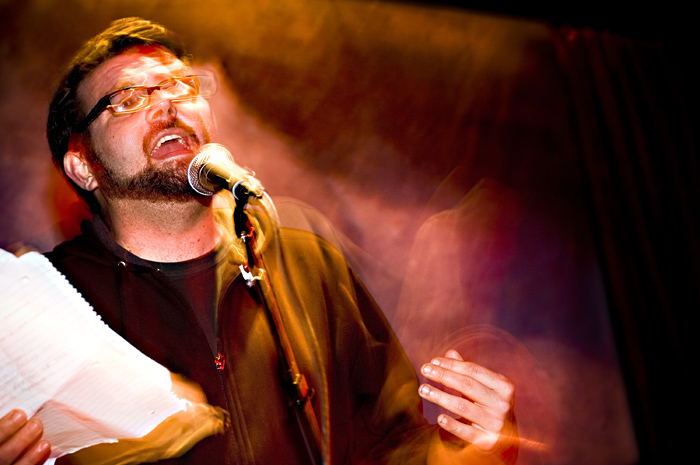As Eirean Bradley stepped up to the mike with thick black-framed glasses, bad posture, and a somber expression, I groaned inwardly. I was at the Seattle Poetry Slam (then located in Fremont), and had consumed a few too many drinks and listened to a few too many tragic anecdotes. I was feeling surlier by the minute, certain this man’s words were going to make me downright suicidal.
Instead, Bradley launched into a 30-second performance in an exaggerated baritone: “I may not look like a lover man/But when it comes to pleasing the ladies, believe me I can/When I leave her addicted/ Amazed at what my dick did/Even Barry White would have to say, ‘Goddamn!'”
My surliness evaporated. The previously hushed crowd erupted in laughter. Bradley swaggered offstage looking smug. The judges gave him mediocre scores. “Oh, c’mon!” Bradley shouted in mock anger. “You try rhyming something with ‘addicted’!”
Those unfortunate enough to have to follow Bradley’s performances always come off dull in comparison. He manages to make tired subjects like unrequited love and the absence of God sound fresh and funny. He’s a hell of a performer. In Jurassic Park, the character Ian Malcolm is described as “the mathematician who thinks he’s a rock star.” Bradley is the poet who thinks he’s a rock star. He’s awkwardly handsome. He’s eccentric and charismatic. And he couches several of his statements with a pre-emptive “Not to sound arrogant, but…”
“I definitely have a persona that gets attention,” Bradley concedes. “That whole thing onstage where I’m twitching and freaking out…People with shame don’t do that. I do the shit people wanna do but don’t.”
And he’s been doing it for 15 years. Bradley’s first brush with spoken word came in 1994, when he was 17 and growing up in Tucson. Ariz. He and his friends snuck into a bar called the Orbit using fake IDs. Their sole motivation was to get a glimpse of KUKQ DJ and slam host Mary McCann. “She was a former Harley-Davidson girl who was a little rough around the edges,” Bradley recalls. “She got me into punk rock. She was the voice that came into my bedroom for four years.”
He wasn’t as smitten with the slam itself. “We thought it sucked,” Bradley says. “It seemed like absolutely everybody was whining about how their uncle touched them funny. My friends were like, ‘Dude, you could win this in a heartbeat.’ So I wrote three pieces right then and there—and I won.”
He received $50—enough prize money to motivate a 17-year-old with no interest in spoken word to return the following week. He won again. “Not to sound arrogant, but I just kept on winning,” he says. In less than a year he qualified to represent Tucson in the National Poetry Slam Championship. He planned to “go to nationals, win the thing, then flip off the entire crowd, take the check, and go home.”
But Bradley was annihilated at nationals. There he realized the craft of spoken word required more than onstage bravado and charisma. “It’s what made me fall in love with an art form that I had thought was absolute bullshit,” he reflects. “I saw what talent some of these people really had, and became a little more serious about it.”
So serious, in fact, that he decided to pursue spoken word full time. Bradley dropped out of college, and began writing feverishly and traveling cross-country to perform. He brought his best friend and $450 worth of stolen food stamps along for the ride. “We were basically living in a Honda Civic,” he says, laughing. “The car was hot-wired because it was falling apart. We’d have to un-hot-wire it when we pulled up to the venue. It was very punk rock.”
Today Bradley lives with his girlfriend in an apartment in lower Queen Anne. He has a full-time job. It’s a far cry from the Kerouac-esque lifestyle he once led. But there are still spastic shrieks and clever lines to be spewed. They’re just going to take place on a smaller stage.
“I’m just never gonna be Saul Williams, you know?” he says. “I don’t have that ability to cross over and blow up, to appeal to everyone…but I can make you laugh for three minutes, and that’s just fine.”
Then he pauses and tracks back. “Not to sound arrogant, but…”





